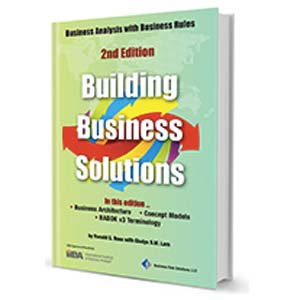Book Review: Business Rule Concepts ~ Getting to the Point of Knowledge (Second Edition)
Ronald G. Ross. Business Rule Concepts ~ Getting to the Point of Knowledge (Second Edition). Business Rule Solutions, LLC, (c)2005, 1998. ISBN: 0-941049-06-X.
A relatively short but content-packed book for both business and IT professionals, Business Rule Concepts is an excellent resource written in easy-to-read style. It is very suitable for both the business professional who is interested in creating agility in business and for the IT professional who is interested in building systems that support agility.
Ross has successfully delivered in concise form the basic knowledge a business professional needs to use the Business Rules Approach as a primary method in business and software design. This pragmatic handbook is neatly divided into two sections.
- The first section, chapters one through three, is written for the general reader and has its focus on key concepts of the Business Rules Approach.
- The second section, chapters four through six, is devoted solely to the practitioner.
For those that believe agility is a primary ingredient of successful business, Ross has cooked up a winning recipe. The subtitle of the book, Getting to the Point of Knowledge, can also serve as the premise -- the conclusion being that without rule independence, true business agility cannot be achieved. Ross offers concrete and practical methods to increase business agility at all levels of business.
Pundits may argue that the approach is too disciplined; however, documenting the business terms and facts forms a solid foundation for sharing and retaining business knowledge, a key factor in an agile business. Disciplined organizations will get the message and run with the ball. Ross has provided an improved description and a more complete reference on how Fact Models should be built, information lacking in the first edition.
A complete categorization of business rules is provided in chapter five. This categorization of rules, a vocabulary and set of rules about rules, will help the serious practitioner analyze and manage core business logic. The conclusion is that each rule costs something and you can't control what you can't manage. A down side is that no reference is given for tools that support the maintenance of terms, facts, and rules.
Throughout the book, insight is provided on how rules and definitions should complement each other. In chapter six Ross makes an attempt to introduce a new term 'time shock'. From this reader's perspective Ross seems to violate the rules against creating new terms as outlined in the opening pages of the book. Ross makes his point, but more time could have been spent on defining the term 'name' -- how to name things well -- a crucial skill in the Business Rules Approach.
The final chapter of the book concludes with insights into the relationship between rules and processes. The idea of externalizing business rules from process and creating 'thin process' by using what Ross calls scripts may prove to be as powerful a pattern as the Model-View-Controller (MVC) pattern is to GUI development.
Despite a few glitches, I believe Business Rule Concepts is a 'must read' (one or both parts) for just about everyone concerned about how their company can achieve business and system agility, on both the business and IT sides. I gained valuable insights at just about every turn -- well worth my time.
# # #
About our Contributor:
Online Interactive Training Series
In response to a great many requests, Business Rule Solutions now offers at-a-distance learning options. No travel, no backlogs, no hassles. Same great instructors, but with schedules, content and pricing designed to meet the special needs of busy professionals.











